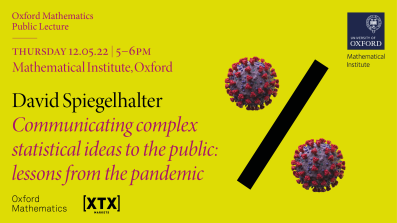Communicating Complex Statistical Ideas to the Public: Lessons from the Pandemic - David Spiegelhalter
Oxford Mathematics Public Lecture
Communicating Complex Statistical Ideas to the Public: Lessons from the Pandemic - David Spiegelhalter
In-person:Thursday 12 May, 5.00-6.00pm, Mathematical Institute, Oxford
Online: Thursday 19 May, 5.00-6.00pm, Oxford Mathematics YouTube Channel
The pandemic has demonstrated how important data becomes at a time of crisis. But statistics are tricky: they don't always mean what we think they mean, there are many subtle pitfalls, and some people misrepresent their message. Their interpretation is an art. David will describe efforts at communicating about statistics during the pandemic, including both successes and dismal failures.
Professor Sir David Spiegelhalter FRS OBE is Chair of the Winton Centre for Risk and Evidence Communication at the University of Cambridge, which aims to improve the way that statistical evidence is used by health professionals, patients, lawyers and judges, media and policy-makers. He has been very busy over the Covid crisis. His bestselling book, The Art of Statistics, was published in March 2019, and Covid by Numbers came out in October 2021. He was knighted in 2014 for services to medical statistics.
Please email @email to register for the in-person event (the online screening requires no registration).
The lecture will be available on our Oxford Mathematics YouTube Channel on 19th May at 5pm (and can be watched any time after that).
The Oxford Mathematics Public Lectures are generously supported by XTX Markets.


